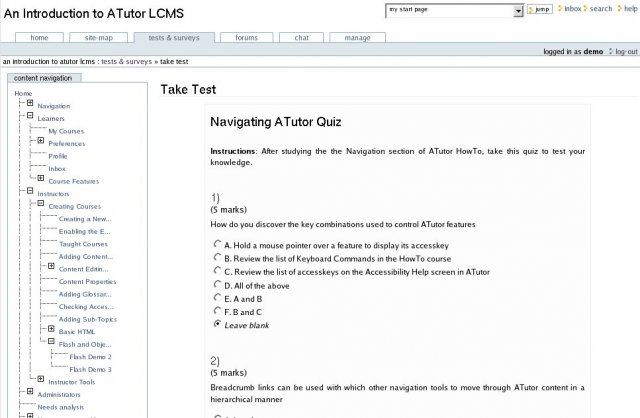ATutor is an open source Web-based Learning Content Management System (LCMS).
Administrators can install or update ATutor quickly, develop custom themes to give ATutor a new look, and easily extend its functionality with feature modules.
Educators can quickly assemble, package, and redistribute Web-based instructional content, easily import prepackaged content, and conduct their courses online. Students learn in an accessible, adaptive, social learning environment.
Features include:
- Inbox / messaging functionality.
- Encrypted login passwords.
- Work groups.
- File storage which can be shared across groups or an entire course.
- Group blogs.
- Feedback.
- Communication tools.
- Students can make tests, check and store the scores.
- Web-based information can be added as links in the ATutor database.
- SCORM Run-Time Environment & SCO Manager.
- Instructor ATutor Handbook: A link to the ATutor Instructor documentation is provided in every section.
- Guest Access to Courses: Guests can access private courses using a link, provided by an instructor. The course can be viewed, but it can not be modified by guests.
- Course Tool Preferences: Instructors can pick only the necessarily tools for defined courses.
- Content Usage: Individual statistics are provided in order to identify issues with the content coverage and the learning progress of each person.
- Work Groups Manager: Different work groups can be created and managed by the instructors.
- File Storage: File Storage functionality allows files to be uploaded, stored and shared with different groups of users.
- Content Editor: HTML content can be created and published in the courses.
- Visual Editor: A JavaScript based WYSIWYG editor is included in the application.
- Reading List: A Reading List with external resources like books can be included by the instructors.
- Backup Manager: The courses can be stored through the backup functionality.
- News & Announcements: Instructors can post news and announcements to inform the students for the courses content and modifications. An RSS feed can be started.
- Polls: Polls can be used to gather students’ opinions.
- Forums: Multiple forums can be set for each of the courses.
- Course Email: Bulk e-mails can be sent to different users.
- Privileges: Tutors can promote students allowing access to different instructors tools.
- Addon Modules: FAQ, Google Search, RSS Feeds, EWiki, ACollab, ATalker Text-to-Speech and SCORM Packages modules are included in the quick installer functionality.
- Module Manager: Administrators can install, enable and disable modules. Some of them are included in the script’s installation package. The others can be integrated additionally.
- Patcher Module: Administrators can easily install different patches and security updates released by the ATutor developers.
- Administrator ATutor Handbook: A link to the ATutor Administrator documentation is provided in every section.
- Administrator Privileges: Specific privileges can be set for each administrator.
- Pretty URLs: Pretty URLs can be enabled. This will ease the search engines in the indexing of the public ATutor courses.
- Themes Manager: Themes can be modified and customized.
- Automated Installer and Upgrade: An easy solution for the ATutor upgrade.
- General Statistics: Shows system usage statistics.
- Secure Course Content: Prevents unauthorized access to courses.
- User Manager: Modification and management of users’ profiles.
- Enrollment Manager: Enrol students to courses.
- Course Manager: Manage courses, assign instructors.
- Backup Manager: Generate backups and download backups of courses.
- Course Categories: Set courses in corresponding categories.
- Language Manager: Import and manage language packs.
- Supports accessibility standards: W3C WCAG 1.0, W3C WCAG 2.0, W3C ATAG 2.0, US Section 508, Italy Stanca Act, IMS AccessForAll 2.0, and ISO FDIS 24751.
- Supports Interoperability standards: OpenSocial 1.0, OAuth Authentication Protocol, IMS Content Packaging 1.1.2+, SCORM Content Packaging, SCORM 1.2 LMS RTE3, IMS Question Test Interoperability (QTI) 1.2/2.1, IMS Common Cartridge 1.0, and W3C XHTML 1.0.
Website: atutor.github.io
Support: GitHub Code Repository
Developer: Inclusive Design Research Centre, OCAD University
License: GNU General Public License v2.0

ATutor is written in PHP. Learn PHP with our recommended free books and free tutorials.
Return to e-Learning Tools | Return to Classroom Tools | Return to Education Top Picks | Return to Librarians’ Tools
| Popular series | |
|---|---|
| The largest compilation of the best free and open source software in the universe. Each article is supplied with a legendary ratings chart helping you to make informed decisions. | |
| Hundreds of in-depth reviews offering our unbiased and expert opinion on software. We offer helpful and impartial information. | |
| The Big List of Active Linux Distros is a large compilation of actively developed Linux distributions. | |
| Replace proprietary software with open source alternatives: Google, Microsoft, Apple, Adobe, IBM, Autodesk, Oracle, Atlassian, Corel, Cisco, Intuit, and SAS. | |
| Awesome Free Linux Games Tools showcases a series of tools that making gaming on Linux a more pleasurable experience. This is a new series. | |
| Machine Learning explores practical applications of machine learning and deep learning from a Linux perspective. We've written reviews of more than 40 self-hosted apps. All are free and open source. | |
| New to Linux? Read our Linux for Starters series. We start right at the basics and teach you everything you need to know to get started with Linux. | |
| Alternatives to popular CLI tools showcases essential tools that are modern replacements for core Linux utilities. | |
| Essential Linux system tools focuses on small, indispensable utilities, useful for system administrators as well as regular users. | |
| Linux utilities to maximise your productivity. Small, indispensable tools, useful for anyone running a Linux machine. | |
| Surveys popular streaming services from a Linux perspective: Amazon Music Unlimited, Myuzi, Spotify, Deezer, Tidal. | |
| Saving Money with Linux looks at how you can reduce your energy bills running Linux. | |
| Home computers became commonplace in the 1980s. Emulate home computers including the Commodore 64, Amiga, Atari ST, ZX81, Amstrad CPC, and ZX Spectrum. | |
| Now and Then examines how promising open source software fared over the years. It can be a bumpy ride. | |
| Linux at Home looks at a range of home activities where Linux can play its part, making the most of our time at home, keeping active and engaged. | |
| Linux Candy reveals the lighter side of Linux. Have some fun and escape from the daily drudgery. | |
| Getting Started with Docker helps you master Docker, a set of platform as a service products that delivers software in packages called containers. | |
| Best Free Android Apps. We showcase free Android apps that are definitely worth downloading. There's a strict eligibility criteria for inclusion in this series. | |
| These best free books accelerate your learning of every programming language. Learn a new language today! | |
| These free tutorials offer the perfect tonic to our free programming books series. | |
| Linux Around The World showcases usergroups that are relevant to Linux enthusiasts. Great ways to meet up with fellow enthusiasts. | |
| Stars and Stripes is an occasional series looking at the impact of Linux in the USA. | |
